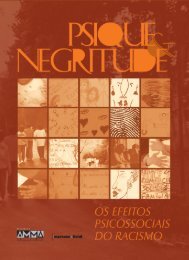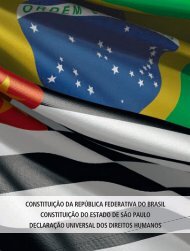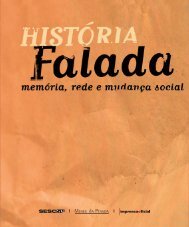CLÁSSICOS BRASILEIROS BRAZILIAN CLASSICS - Imprensa Oficial
CLÁSSICOS BRASILEIROS BRAZILIAN CLASSICS - Imprensa Oficial
CLÁSSICOS BRASILEIROS BRAZILIAN CLASSICS - Imprensa Oficial
You also want an ePaper? Increase the reach of your titles
YUMPU automatically turns print PDFs into web optimized ePapers that Google loves.
Brazilian Classics<br />
A selection of authors with works in public domain<br />
88<br />
MANUEL DE OLIVEIRA PAIVA<br />
(1861 – 1892)<br />
If it were not for literary historian Lúcia Miguel<br />
Pereira's persistence and intuition, besides a<br />
fortuitous chain of events, Manuel de Oliveira<br />
Paiva would be today an obscure writer, not<br />
only for the larger audience, but even for<br />
literature teachers and researchers. When<br />
he died at the age of 31, he had published his<br />
first novel, A afilhada (The goddaughter), only<br />
in serial format, besides a few short stories in<br />
newspapers. His path was bound to predestine<br />
him to anonymity. Rescued from limbo, it<br />
became evident that his book, D. Guidinha do<br />
poço, published more than sixty years after his<br />
death, may be regarded as the first novel and a<br />
precursor-of Brazilian regionalism. The density<br />
of this work would only be beaten thirty years<br />
later by Graciliano Ramos's work. Oliveira<br />
Paiva's pioneering contained and temperate<br />
text, where free indirect speech prevails, is also<br />
marked by idiosyncrasy and by an insurgence<br />
against the literary values of his time, when<br />
romantic and realist-naturalist values had taken<br />
deep roots in the Brazilian novel.<br />
Review<br />
Main works<br />
Excerpt<br />
D. Guidinha do poço<br />
In the beginning, there used to exist a farm<br />
called Poço da Moita which was located on the<br />
banks of Curimataú, o tributary to Jaguaribe<br />
river. Established during the last century by<br />
a Portuguese gentleman called Reginaldo<br />
Vanceslau de Oliveira, it was handed down<br />
to children ond grandchildren. Should the<br />
unfortunate event that provides the main subject<br />
for this norrative have not occurred, it would still<br />
be upright today with its iron and sign.<br />
Standing on the left bank of the impetuous<br />
hibernal canal, the farm house had been erected<br />
on top of a hill, from where one could see a large<br />
extension around, especially during the dry<br />
season. During the winter, the overabundance of<br />
foliage would restrict the range of sight […].<br />
Poço da Moita had recently been passed on to<br />
Margarida, Reginaldo's first granddaughter, who<br />
happened to be the Militia Chief 's daughter and<br />
married to Major Joaquim Damião de Barros, a<br />
tall and blunt giant, born in Pernambuco - a good<br />
guy. He had come from Ceorá to buy horses,<br />
and eventually stayed, as he fell in love with and<br />
got hung on Guidinha do poço's fine attributes.<br />
His iris was yellow, with a greenish pupil, which<br />
made him resemble a tupuru.<br />
Descriptive subtlety<br />
"What [ ... ] seems to constitute the most significant feature in this writer is his mastery with which he combined emotional<br />
and material elements, that is, the art of making suggestive whichever detail, of utilizing objective indications to indirectly<br />
reinforce the narrative's point of compass, ar to insinuate the personality of a character."<br />
(Lúcia Miguel Pereira, foreword to D. Guidinha do poço)<br />
Drought as a character<br />
"[ ... ] Manuel de Oliveira Paiva anticipates the presence of a theme that would become one of the strongest topics in the<br />
Brazilian modernist romance. The drought, in the novel, is used as background, through the presence and the performance<br />
of migrants taking up lodge in the farm and the references to the farm and properties general situation."<br />
(Domício Proença Filho, foreword to D. Guidinha do poço)<br />
A afilhada [in feuilleton] (1889); D. Guidinha do poço (1952); A afilhada (1961); Contos (1976).









